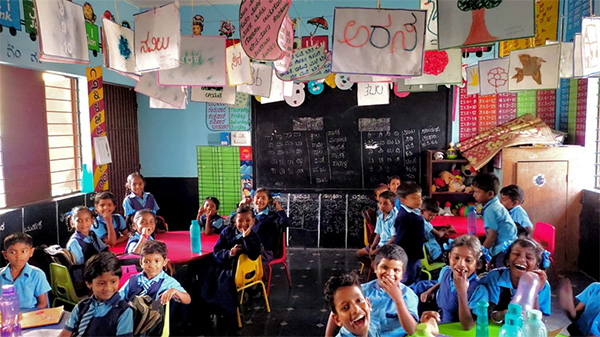
Extension Activities
Household Survey - Prayas Extension Club
Date: 28 October, 2025
The Department of Professional Management Studies, under the School of Business and Management, organized a Household Survey to Marjenahalli, Kolar Taluk on 28th October 2025, in collaboration with Unnat Bharat Abhiyan and facilitated by the Prayas Extension Club. The activity aimed to bridge academic learning with real-world social understanding by engaging students in a structured rural survey.
During the visit, students conducted door-to-door household surveys to gather data on income levels, educational attainment, employment status, sanitation, and healthcare access. They interacted with local residents to assess their awareness and utilization of government welfare schemes. Faculty coordinators guided students on ethical field practices, data documentation, and observation of rural socio-economic dynamics.
This community extension programme provided a platform for students to apply concepts of research methods, data collection, and rural management in a real-life setting. It enhanced their understanding of inclusive growth and community engagement, aligning classroom learning with societal development. The initiative also benefited the local community by helping identify areas needing attention in education, sanitation, and resource allocation.
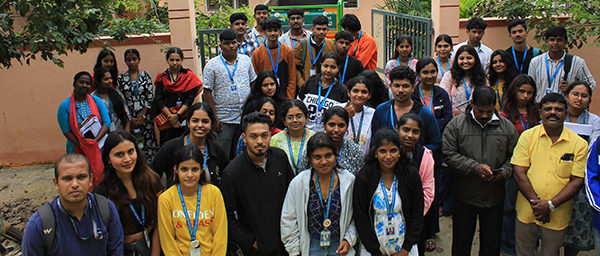
An Awareness Session on Cervical and Breast Cancer
Date: 05 February, 2025
An expert talk on Cervical and Breast Cancer was organised for the Girl Students of the department on 5th February 2025 related to creating an awareness on Breast and Cervical cancer as women are the victims of these cancer in India. The session aimed to raise awareness and educate students on breast and cervical cancer, as well as promote a culture of respect within the institution.
Dr. Nithya Manayath, a renowned Surgical Oncologist from Baptist Hospital, Bangalore, was the resource person for the session. She delivered an informative and engaging presentation, covering essential topics such as the importance of early detection, symptoms, risk factors, and prevention strategies for breast and cervical cancer. The session was highly interactive, with students actively participating in the discussion and asking thoughtful questions. Dr. Manayath’s expertise and approachable demeanor helped create a safe and supportive environment for the students to openly discuss their concerns and queries. The program was well-received by the students, who appreciated the opportunity to learn about these critical health issues. The session not only educated the students but also empowered them to take charge of their health and well-being.
Overall, the awareness session on cervical and breast cancer was a resounding success, and we are grateful to Dr. Nithya Manayath for sharing her expertise with our students.
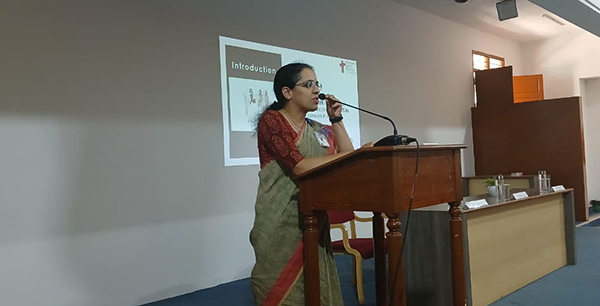
Stationery Distribution Drive
Date: 15 November, 2024
As part of the Children’s Day celebrations, a stationery distribution drive was organized for the students of Government Primary School at K.Narayanapura, Bangalore. The initiative aimed to support and motivate young learners by providing essential learning tools such as notebooks, pens, pencils, erasers, and crayons. A total of 55 notebooks, 55 Stationery sets and 40 crayon boxes were by the volunteers of PRAYAS – Department Extension Activity to the Government school children. The event commenced with a brief session highlighting the significance of Children’s Day and the importance of education in shaping their future. The children expressed their excitement and gratitude as they received their kits, which will aid them in their academic journey.
This initiative not only celebrated the spirit of childhood but also reinforced the message that education is a fundamental right for every child. The event concluded with fun activities and warm smiles, making it a memorable day for everyone involved.
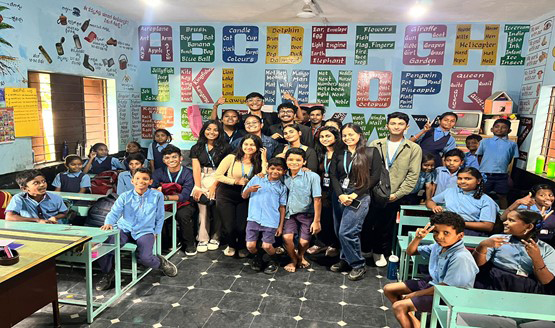
Mid Day Meal Scheme for the Underprivileged
Date: 19 to 13 October, 2024
PRAYAS Mid-Day Meal Scheme for the underprivileged aimed at addressing hunger and improve the nutritional status of underprivileged individuals, ensuring they receive at least one wholesome, balanced meal a day programme. This programme involved the entire class of dedicated participation of final year and second year students from the Department which was organized every week from 19/09/2024 to 13/11/2024. The activity successfully addressed nutritional needs by providing nutritious meals to school children and impoverished families and labourers. The students played crucial roles in distribution of food packets to the needy people at different localities. Their contribution significantly impacted the lives of many children and families and demonstrated the power of collective effort in creating a healthier society.
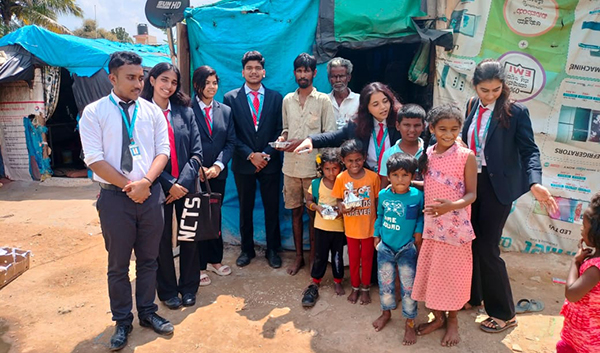
“Swabav Swachata, Sanskar Swachata” - Cleanliness Drive
Date: 23 & 24 September, 2024
Department of Professional Management Studies organized a cleanliness drive under the theme “Swabav Swachata, Sanskar Swachata” –an extension activity PRAYAS -"Ek Koshish” to promote cleanliness and care for the environment. The Event was organised in collaboration with the Ministry of Tourism, Bengaluru Office, Government of India with the motive of supporting the national mission “Swabhav Swachhata, Sanskar Swachhata” which signifying that a prosperous environment is nurtured solely through the harmonious collaboration of personal virtues and shared beliefs. The two-day event was hosted at Bande Bommasandra Lake, near Anagalipura Gate, Bengaluru and at Antaragange in Kolar District 23rd and 24th September 2024. 100 enthusiastic volunteers teamed up to clean the lake area at Bande Bommasandra; urging a domino effect on the villagers to maintain communal spaces and reflect on environmental care.
The cleanliness drive at Antaragange, Kolar fostered to invigorate the indispensable need to preserve a clean and green environment at tourist locations. The combined efforts of students and faculty not only emphasized the significance of cleanliness but also encouraged others to undertake timely and momentous actions towards sustaining a healthier community. Around 232 residential houses and ensuing flora and fauna, pedestrians and tourists benefited by the initiative of the student volunteers.
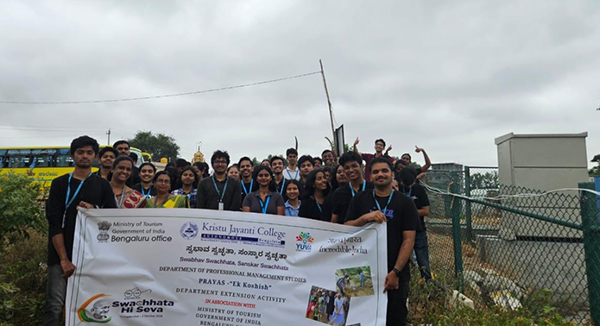
Anti Ragging Week
Archive: Extension activities
The Department of Professional Management Studies under its banner PRAYAS conducted Anti Ragging week from 13/08/2024 to 16/08/2024, with its theme Stay Safe, Stay Kind. This year’s event emphasized our collective commitment to fostering a safe, respectful, and inclusive academic environment. PRAYAS 2024 was designed not only as a gathering but as a movement aimed at confronting and eradicating the troubling issue of ragging. The event focused on raising awareness, educating participants, and encouraging actionable steps to ensure the well-being and dignity of all students. By concentrating on the theme of anti-ragging, PRAYAS sought to inspire change and promote a culture of respect within educational institutions. The event was comprised with a multitude of activities such as Tableau, Poster-making, Mime and an Expert Talk.
Tableau: An activity tableau, designed around the theme of anti-ragging, is a dynamic and visually engaging presentation that depicts key aspects of the issue and the collective efforts required to address it. It combines visual storytelling with interactive elements to educate and inspire participants about the importance of preventing ragging and fostering a respectful academic environment. The primary objective of the activity tableau, centered around the theme of anti-ragging, is to enhance awareness about the issue of ragging and its detrimental effects on individuals and communities. By contrasting these negative portrayals with scenes of positive, respectful interactions, the tableau seeks to emphasize the importance of kindness and inclusivity. Furthermore, it encourages participants to actively engage in role-playing scenarios and discussions, fostering a deeper understanding of the issue and promoting effective prevention strategies. Through these activities, the tableau aspires to inspire a collective commitment to creating a safer and more respectful academic environment.
Mime: The activity mime, themed around anti-ragging, was a powerful and expressive form of performance art designed to convey the emotional and psychological impact of ragging without the use of spoken words. Mime, with its reliance on gesture, facial expressions, and physical movement, provides a unique medium to illustrate the experiences of those affected by ragging and to promote a culture of respect and understanding within academic settings. The primary objective of the anti-ragging mime activity is to use expressive, non-verbal performance to convey the profound emotional and psychological impact of ragging on individuals. Through vivid and emotive scenes, the mime aims to highlight both the distress experienced by victims of ragging and the contrast with supportive, respectful behavior. By engaging the audience in this visual and emotional representation, the activity seeks to foster empathy, increase awareness, and provoke reflection on the consequences of ragging.
Poster Making: The activity of poster making, centered around the theme of anti-ragging, is a creative and impactful way to raise awareness and advocate for a respectful and inclusive academic environment. Through designing and creating posters, participants express their understanding of the issues related to ragging, promote positive behavior, and encourage collective action against bullying and harassment. The primary objectives of the anti-ragging poster making activity are to creatively and visually communicate the harmful effects of ragging and the importance of preventing it. By designing impactful posters, participants aim to raise awareness about anti-ragging policies and support systems, and inspire individuals to take a stand against bullying and harassment. The activity encourages creative expression while reinforcing messages of inclusivity and respect, ultimately engaging the community in fostering a safer and more supportive academic environment.
Expert Talk: The expert talk on the theme of anti-ragging, conducted by Mr. Debarghya Bhattacharya, Assistant Professor, Kristu Jayanti College of law addressed the first year PMS Students. The session was a significant educational activity aimed at addressing the critical issue of ragging within academic institutions. As an expert in the field, Bhattacharya brings a wealth of knowledge and experience to shed light on the complexities of ragging, its impact on students, and effective strategies for prevention and intervention. The objectives of Mr. Debarghya Bhattacharya's expert talk on anti-ragging are multifaceted. Firstly, the talk aims to educate attendees on the definition and various forms of ragging, providing a clear understanding of this issue. It also seeks to outline the legal framework surrounding ragging, including national laws and Supreme Court rulings, to clarify the legal obligations of educational institutions. By detailing the responsibilities of these institutions, the talk emphasizes their role in creating a safe environment through effective anti-ragging policies and support services. Additionally, it empowers students by informing them of their rights and responsibilities and explaining how to report incidents and seek legal recourse. Real-life case studies are presented to provide practical insights and demonstrate the impact of ragging and preventive measures.
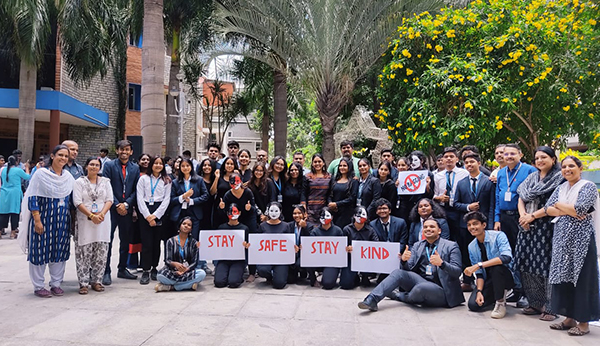
Water Conservation Campaign
The Department of Professional Management Studies organised this campaign majorly to bring awareness among the nearly locality about the scarcity of water in Bangalore and how to conserve them during our everyday chores and usages. The conservation of water which is a precious resource and should be conserved for future generations also. The main objective of the save water campaign was to increase awareness of the locality neighbourhood about the scarcity of clean water and sensitize them about the conservation of water, a precious resource. The campaign aimed at reducing everyday water usage rate due to the water crisis in our state.
With this campaign people were sensitized about the importance of every drop of water and ways to conserve water also reduce the wastage of water to overcome the consequences of scarcity of water which will be faced by people in future. Our slogan for this campaign was “Save a drop for a change” to save as much as water and not waste it as it would be useful for future.
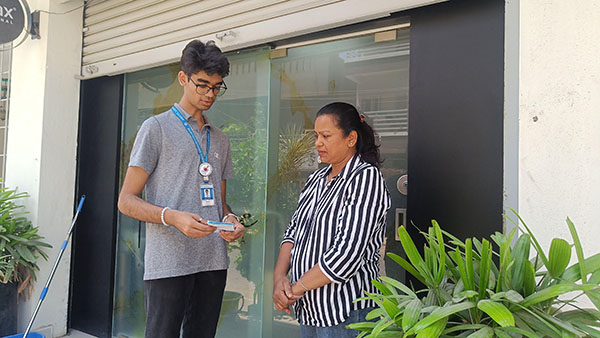
Stationary Distribution Drive
Date: 24/01/2024
The Department of Professional Management Studies started off the year with their first event on the occasion of “International Education Day” called ”Stationary Drive”, which is a program where we provide essential stationary items to enhance the learning experience of students in government schools, thereby fostering a conducive environment for academic growth. What sets this program apart is the collective participation of not just our volunteers, but the entire department in this campaign. Students from our department generously contributed stationary items such as pencils, books, colour pencils, etc., for the benefit of underprivileged students attending Government schools. The Stationary Donation Program aspires to make a meaningful contribution to the educational landscape, creating a positive impact on the lives of students in government schools and fostering a culture of compassion and support within our community.
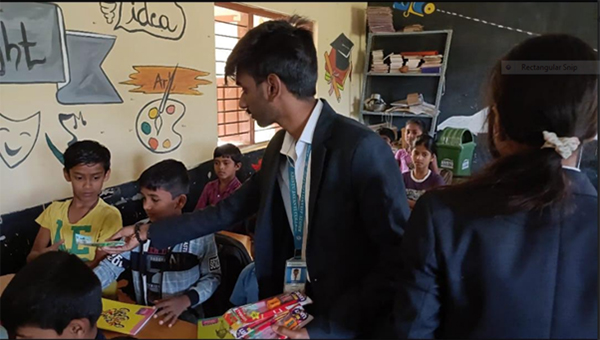
Commemorating National Unity Day Poster Making Competition
Date: 31/10/2023
This initiative sought to build a foundation of mutual respect and understanding among future generations. Commemorating Unity Day in government schools by BBA PMS students, served as a powerful initiative to promote national cohesion and understanding. The primary objectives include instilling a sense of patriotism and unity among the younger generation, fostering a shared cultural identity, and nurturing a deep appreciation for diversity. Through engaging activities and educational programs, college students aim to inspire a collective spirit of harmony and solidarity, transcending differences and reinforcing the values that bind a nation together. This commemoration not only strengthens the social fabric but also lays the foundation for a more inclusive and harmonious society in the future.
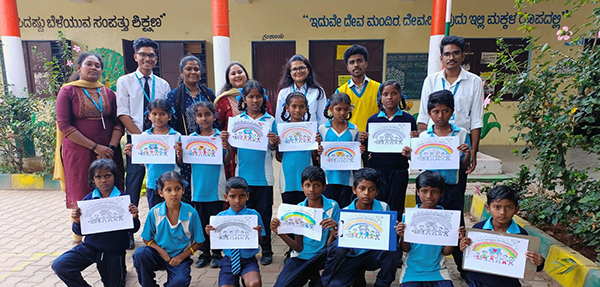
Prayas - “Each One, Teach One”
The Department of Professional Management Studies organized their very third event of the Department. “Each One, Teach One” which is nothing but a program where the students of our department come together to engage and educate the children studying in Government Schools. This is a 7 days Activity which will be done on a regular basis. By participating in programs where older students help their younger peers, these students not only contribute to the learning process but also gain valuable teaching experience. This interaction fosters a sense of community and peer support within the school, creating a more inclusive and collaborative learning environment. Moreover, it allows the older students to reinforce their own understanding of the subjects they teach, as teaching often deepens one's comprehension. Overall, students teaching in government schools can be a win-win, fostering a culture of shared knowledge and empowerment among both students and educators.
